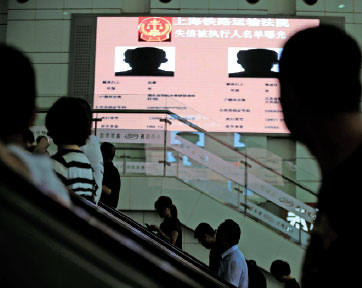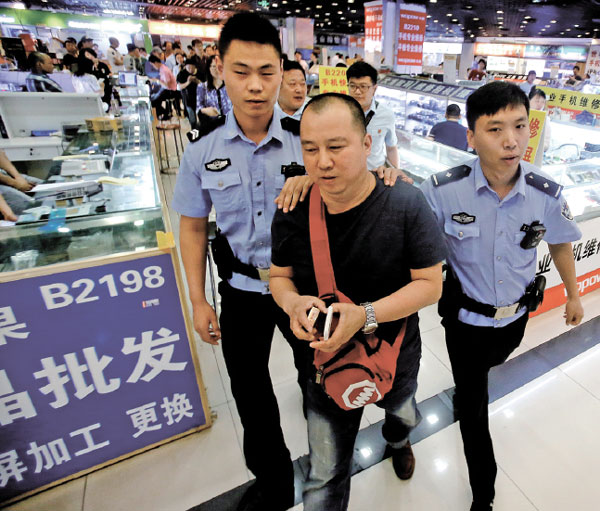Court blacklist derails debt defaulters
Updated: 2016-11-02 06:50
By Cao Yin(China Daily)
|
|||||||||
The government is strengthening measures designed to make life difficult for debtors and people in contempt of court and encourage them to abide by verdicts. Cao Yin reports.
On Oct 8, her first working day after the National Day holiday, Liang Wenjuan, from Chifeng, a city in the Inner Mongolia autonomous region, found herself stranded in Jiuzhaigou, Sichuan province.
The entertainment manager had attempted to buy a plane ticket, but her credit card was rejected because Hongshan District People's Court in the autonomous region had added Liang to its online blacklist of defaulters, which meant she was subject to a range of restrictions, including a ban on buying rail or plane tickets.
The action was taken because Liang had taken a bank loan of 250,000 yuan ($36,850) in 2011, but failed to keep up the repayments. The district court ordered her to repay the debt, but she ignored the ruling.
By October, the combined principal and interest had soared to 400,000 yuan. It was then Liang discovered her name had been added to a blacklist intended to make life so inconvenient for debtors and others who ignore court rulings that they feel compelled to repay outstanding debts and accept the verdict.
"I discovered I couldn't buy a ticket for a flight back home. I was told my name had been added to the blacklist because of my refusal to abide by the court ruling," she said. "Actually, I had almost forgotten about the case. I had to clear the debt straightaway because I was desperate to get home."
Later the same day, one of Liang's employees deposited 400,000 yuan with the court, bringing the five-year dispute to an end. Later, Liang's name was removed from the blacklist and the restrictions were lifted.
The blacklist is increasingly being used to disrupt the lives of defaulters and others who fail to comply with court rulings and ensure full, rapid repayment.
Statistics provided by the Supreme People's Court, the nation's top judicial body, show that between 2013 and last year, the courts concluded 9.44 million verdict-enforcement cases - a rise of more than 28 percent from 2010 to 2012 - and 3.2 trillion yuan was repaid, an increase of 110 percent over the same period.
In March, the top court attributed the developments to the impact of the blacklist and the restrictions levied in conjunction with government departments.
Origins
The blacklist partly has its origins in a 2010 case handled by Yang Haichao, a judge at Haidian District People's Court in Beijing, when a debtor who owed a company 100,000 yuan went to ground.
"I accidentally discovered that he had several thousand yuan in an account at China Agricultural Bank, so I immediately rushed to the bank and froze the account," Yang recalled. "It was a relatively small sum so I thought it might not matter. Later I got a call that changed my mind."
The caller was the debtor, who told Yang he wanted to repay the money as quickly as possible. "I was surprised initially, but I realized he had been forced to pay because I had frozen the account he used for his mortgage payments. He told me that his credit rating at the bank would be affected if didn't pay his mortgage, which made me realize that blocking debtors' assets might be a good way of enforcing verdicts," Yang said.
His idea predated the first defaulters' blacklist, published in 2013, and helped to prompt cooperation with government bodies. "The courts finally took the initiative on verdict enforcement," he said.
Restrictions
By the end of August, the personal details of nearly 5 million people in contempt of court, including their names and identity card numbers, were open to public scrutiny, according to the court's statistics. The measures mainly target debt defaulters who are able to repay the money but repeatedly refuse to do so.
Since June 2014, the top court has been collaborating with government departments, especially the rail and civil aviation authorities, to deny defaulters access to rail and air transport.
By Aug 31, the system had rebuffed more than 4.7 million attempts to purchase plane tickets, along with 1.55 million bids to buy seats on the high-speed rail network.
"What we want to do is make people who refuse to comply with court verdicts feel inconvenienced in every aspect of their lives," said Meng Xiang, director of the top court's bureau of verdict enforcement.
Meng said 44 government departments are currently working with the court, and the restrictions have been extended to areas such as online shopping, running businesses and buying real estate: "Our goal is to contribute to the establishment of a 'merit system' in society."
Information network
In recent years, Yang, the judge in Beijing, has witnessed a change in the way verdicts are enforced.
"In 2010, our court didn't even have an internal network to share information about defaulters, let alone a platform that would allow us to work with banks and government departments," he said. "I had to visit banks several times a week to discover what properties a debtor owned."
Now, a high-speed network that links courts with banks means properties can be detected with just a few clicks of a mouse, according to Yang.
In September, the central leadership issued a regulation ordering government departments to coordinate enforcement with the courts to further strengthen the merit system.
The rule stipulates that people in contempt of court will face restrictions if they apply for government subsidies, and they are barred from working in the financial sector or becoming board members of State-owned enterprises, resulting in more than 66,000 suggested appointments being blocked.
They also face tougher exams if they apply to join the civil service, the army or the Communist Party, and they are not allowed to stay at hotels rated three-star or higher. The children of defaulters are barred from studying at expensive private schools.
Zhou Qiang, president of the Supreme People's Court, has repeatedly stressed that adoption of the measures should be a priority for grassroots courts, with the aim of solving the problem within three years. "Cases only end for litigants when they are repaid," he said.
Along with the merit system, technological developments have made it easier for the courts to track defaulters, according to Yang.
"A prosecutor's role is to pursue defaulters, but we used to find it hard to keep up with them because they used high-tech equipment to keep one step ahead. We have only recently started using similar equipment and techniques. At the same time, we need other players, such as the industrial and commercial authorities, to help us block them or tell us where they are," he said. "When people in all walks of life combine against those who refuse to accept court verdicts, we'll win the day."
Contact the writer at caoyin@chinadaily.com.cn
|
People pass an electronic screen displaying the personal details of debt defaulters at Shanghai Railway Station. Aly Song / Reuters |
|
Police officers escort a man from the Zhongguancun Dinghao Electronic Mall in Beijing after he was detained for refusing to repay an eight-year-old debt. Cao Boyuan / For China Daily |
(China Daily 11/02/2016 page6)
Today's Top News
S. Korean prosecutors arrest president's confidante
Premier to visit Central Asia and East Europe
Police swoop on Paris migrant camp
Email probe takes toll on Hillary's campaign: poll
Strongest quake in decades hits central Italy
EU, Canada sign landmark deals
Party ramps up supervision
Queen Elizabeth visits new town Poundbury
Hot Topics
Lunar probe , China growth forecasts, Emission rules get tougher, China seen through 'colored lens', International board,
Editor's Picks

|

|

|

|

|

|









